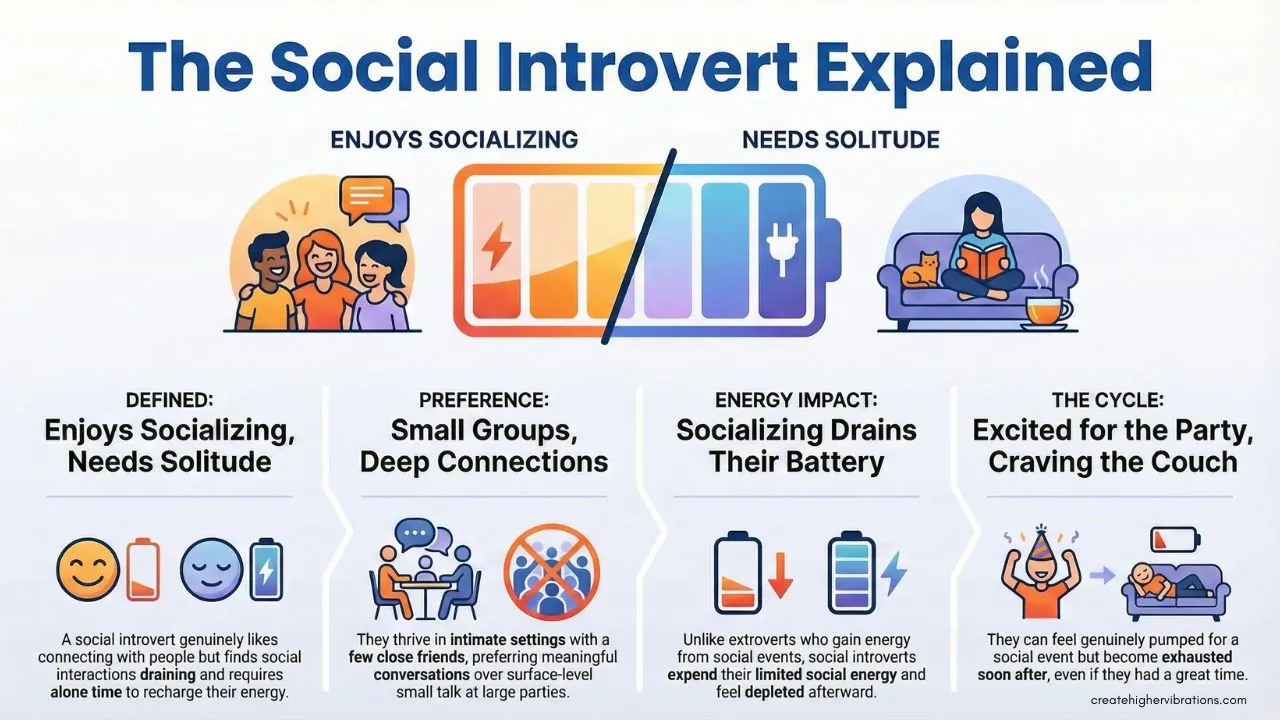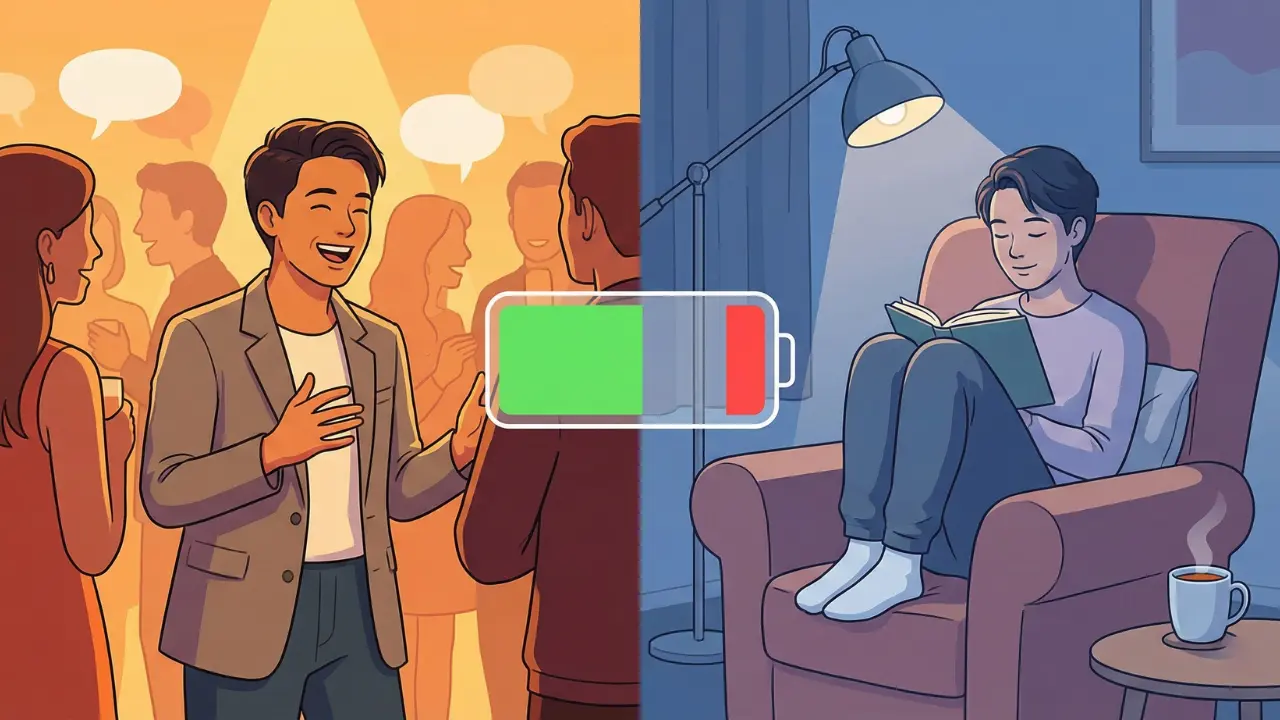12 Social Introvert Traits: Why You Love People but Need to Escape Them

You are at a dinner party. You are laughing, telling stories, and keeping the conversation alive. People gravitate toward you. To an outsider, you look like the classic extrovert: confident, engaging, and full of energy.
Then, the clock hits 9:00 PM.
Suddenly, you hit a wall. It feels like someone pulled the plug on your power supply. The noise becomes irritating. The small talk feels physically heavy. All you want to do is go home, lock the door, and not speak to another human being for two days.
This drastic shift often leaves you confused. You might ask yourself: Am I fake? Do I hate people? Is there something wrong with my mental health?
You aren’t “fake,” and you aren’t an extrovert who is having a bad day. You are likely a Social Introvert.
This is a personality type that exists in the gray area. It confuses friends and partners because it appears to be a contradiction. You crave connection, but interaction drains you. You have excellent social skills but a limited social battery.
According to personality psychology, introversion isn’t about how shy you are. It is about how you gain and lose energy. While the shy person fears social judgment, the social introvert simply fears the energy crash.
If you feel stuck between two worlds, too quiet for the extroverts and too loud for the introverts, this guide is for you.
Here is the science behind why you function this way, the 12 clear signs that define this personality, and how to stop burning yourself out trying to be someone you’re not.

What Is a Social Introvert?
First, let’s clear up a common misconception. “Social Introvert” is not a medical diagnosis. You won’t find it in the DSM-5 (Diagnostic and Statistical Manual of Mental Disorders).
Instead, it is a specific personality style that falls under the broader umbrella of introversion.
In the early 20th century, psychiatrist Carl Jung defined introversion and extroversion based on where you get your energy.
A Social Introvert is someone who sits right on the border. You genuinely enjoy the external stimulation, the parties, the networking, the deep conversations, but unlike an extrovert, this stimulation costs you energy. It does not give you energy.
Think of it like a smartphone with an old battery. You can run high-performance apps (socializing, presenting, leading), and they work perfectly. But your battery drains twice as fast as everyone else’s. When you hit 0%, you don’t just get tired; you shut down.
The Neuroscience: Why Your Battery Drains
Why do you hit that wall while your friends are ready for the after-party? The answer lies in your brain chemistry.
Research suggests that introverts and extroverts process dopamine differently. Dopamine is the “reward chemical” your brain releases when you take risks, meet new people, or encounter surprises.
Instead of dopamine, social introverts thrive on a different neurotransmitter called acetylcholine.
Acetylcholine is released when you turn inward. It makes you feel good when you are reading, focusing deeply on a hobby, or having a quiet conversation with one trusted friend.
The conflict: As a social introvert, you emotionally desire the connection (dopamine activities), but your nervous system is wired to prefer the calm (acetylcholine activities). You are essentially fighting a biological tug-of-war every time you say “yes” to an event.
This isn’t a defect. It is simply how your hardware is built.

12 Signs You Are a Social Introvert
Do you fit the profile? If you identify with more than eight of these signs, you are likely operating with a social introvert’s nervous system.
1. The “Performance Switch.”
You have an uncanny ability to “turn it on.” When you walk into a meeting or a party, you can smile, shake hands, and crack jokes. You don’t stand in the corner. But this isn’t your natural state; it is a performance. You are spending energy to be there, whereas an extrovert is gaining energy. Once the event is over, you turn the switch off immediately.
2. The “Irish Exit” is Your Best Move
You are famous for leaving parties early or slipping away without saying goodbye. This isn’t because you are rude. It’s because you hit your limit abruptly. One minute you are fine; the next minute, you feel a physical need to escape. Saying goodbye to everyone feels like an impossible task that requires energy you no longer have.
3. Small Talk feels like Manual Labor
Asking “How about this weather?” feels physically painful to you. You struggle to fake interest in surface-level topics. However, if someone brings up philosophy, space travel, or a deep personal struggle, you light up. You can talk for hours about ideas, but you burn out in minutes talking about events.
4. You Need “Pre-Game” Solitude
If you have a big wedding or networking event on Saturday night, you naturally try to keep your Saturday morning empty. You intuitively know that you need to “bank” energy before you spend it. If your day is busy before the event starts, you show up already exhausted.
5. The Phone Call Dread
You can text all day. You are witty and responsive via email. But when the phone rings unexpectedly? You stare at it until it stops ringing. It feels like an intrusion. You need time to mentally prepare for a verbal interaction.
6. You Have a “Social Hangover.”
After a weekend of socializing, you feel physically ill on Monday morning. You might have a headache, brain fog, or extreme lethargy. This is the “introvert hangover.” Your brain has depleted its dopamine reserves and needs time to recalibrate.
7. You Are Observant
In a group setting, you listen more than you speak. You are constantly reading the room, noticing body language, and picking up on tension that others miss. This makes you a great coach or advisor, but processing all that data is tiring.
8. You Prefer Groups of Three, Not Thirty
You aren’t anti-social; you are “selectively social.” You thrive in small, intimate groups where you can control the noise level and the depth of conversation. Large crowds make you feel lonely because a true connection is impossible in the noise.
9. Networking feels Transactional
You hate working the room. Handing out business cards to strangers feels fake. You would rather spend the entire night talking to one interesting person in the corner than meet twenty new people.
10. You Are Easily Overstimulated
It’s not just people. Loud music, bright lights, and chaotic environments drain your battery just as fast as conversation does. You are sensitive to your environment.
11. People Think You Are Extroverted
This is the curse of the social introvert. Because you have good social skills, people assume you always want to hang out. They are shocked when you turn down an invitation, often taking it personally. “But you were so fun last night!” they say, not realizing that was your energy budget for the week.
12. Solitude is Your Medicine
You don’t just “like” being alone. You need it. Solitude is how you process your emotions and reset your baseline. Without it, you become irritable and anxious.
Discover Your Inner Self. Join Our Self-Mastery Program.
Self-Mastery Coaching gives you the space, tools, and guidance to grow, reflect and discover your values and inner strength.

Social Introversion vs. Social Anxiety
This is the most common question I hear: “Am I a social introvert, or do I just have social anxiety?”
It is vital to know the difference because the solutions are opposite.
Social Anxiety is based on fear. It is the worry that you will be judged, embarrassed, or rejected. If you stay home because you are terrified of saying the wrong thing, that is anxiety.
Social Introversion is based on energy. You aren’t afraid of the party; you know how much it will cost you. If you stay home because you are happily reading a book and don’t want to drain your limited battery, that is introversion.
Here is a quick way to tell them apart:
Note: You can be both. But mastering your life requires treating the anxiety (conquering the fear) while honoring the introversion (respecting the energy).

The “Introvert Hangover”: Managing Your Energy
If you ignore your limits and push through the battery warning, you will crash. This is often called the “Introvert Hangover.”
It isn’t just a mood swing. It is a physical reaction. Your brain has depleted its glycogen stores and over-saturated its dopamine receptors. You might feel:
How to Recover: You cannot “think” your way out of an introvert hangover. You need to rest your way out.
How to Thrive (Not Just Survive)
You don’t need to cure your introversion. You need to master it. The goal isn’t to become an extrovert; it’s to become a high-functioning introvert.
1. Set a “Hard Out” Time: Before you go to a party, decide when you are leaving. “I will stay for two hours.” When that time hits, leave. Knowing there is an endpoint reduces the subconscious stress of the event.
2. Audit Your Calendar: Look at your week. If you have a high-energy presentation on Wednesday, do not schedule a dinner date for Tuesday night. Sandwich your high-drain activities with recovery blocks.
3. Communicate Your Needs: Tell your friends, “I love hanging out with you, but my battery is dead. I need to recharge so I can be fun again.” People respect boundaries when you explain them clearly.
Subscribe to Create Higher Vibrations!
Get Inspiration and Practical advice straight to your inbox.
Final Takeaway
Being a social introvert can feel like a contradiction. You live in a tug-of-war between the fear of missing out and the fear of burning out.
But when you stop fighting your nature, you realize it is actually a superpower.
You have the social intelligence to connect deeply with people, combined with the introspective depth to understand the world on a different level. You don’t need to be the loudest person in the room to be the most impactful. You need to learn how to manage your battery.
Don’t let the “introvert hangover” control your life. You can attend the parties, ace the meetings, and build the relationships you want with the right strategy.
Ready to Master Your Energy?
If you are tired of the cycle of socializing and crashing, I can help.
In my 1:1 Coaching Sessions, we don’t just talk about personality types. We build a custom operating system for your life. We look at your schedule, your relationships, and your goals to create a plan that protects your energy while amplifying your impact.
[Click here to book your discovery call] and let’s turn your social friction into social mastery.
(Not ready to commit? Join my weekly newsletter below for free tips on navigating an extroverted world.)
Namaste 🙂
Frequently Asked Questions About Social Introverts
An ambivert sits exactly in the middle of the spectrum, gaining energy from both social interaction and solitude equally. A social introvert, however, leans toward the introverted side. They enjoy socializing (like an ambivert) but still lose energy from it and require solitude to recharge (like an introvert).
No, you cannot change your core personality type, as it is linked to your brain’s response to dopamine. However, you can improve your social skills and stamina. Trying to force yourself to be an extrovert usually leads to burnout. The goal is management, not change.
This is a biological response called the “introvert hangover.” When your brain is overstimulated by dopamine, it releases cortisol (the stress hormone). That sudden feeling of annoyance is your body’s warning signal that your energy resources are depleted and you need to retreat to safety.
While exact statistics are hard to measure, many experts believe “Social Introverts” make up a significant portion of the introvert population. They are often mistyped as extroverts because of their social skills, making them seem rarer than they actually are.
Use the battery analogy. Explain that while they recharge by talking to you, you recharge by being quiet near them. It isn’t a rejection of them; it is a physical need for recovery. Reassure them that taking space makes you a better partner, not a distant one.


